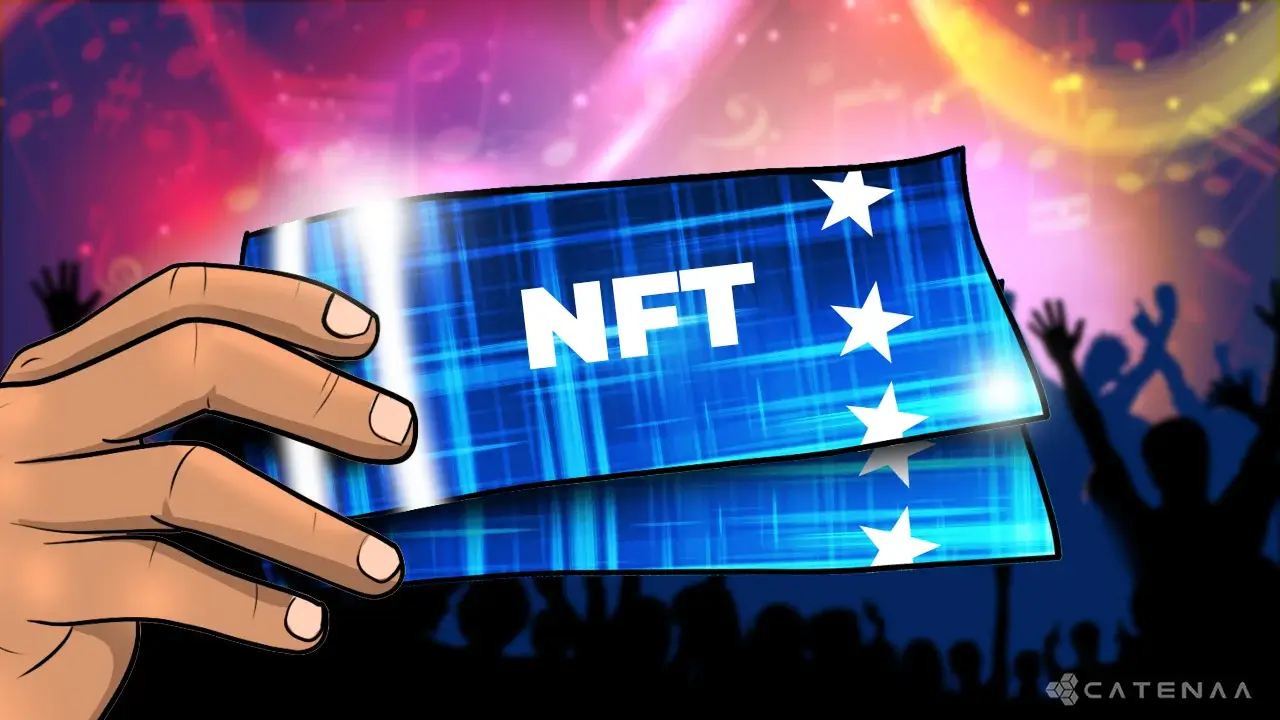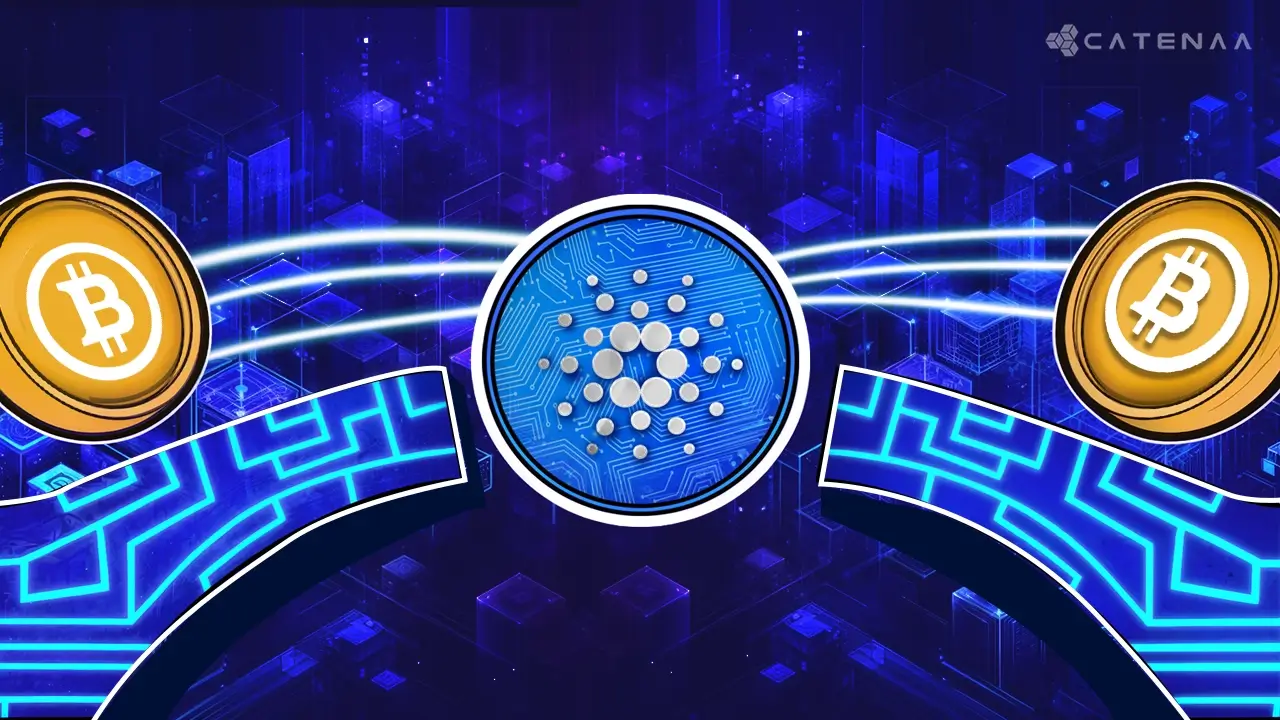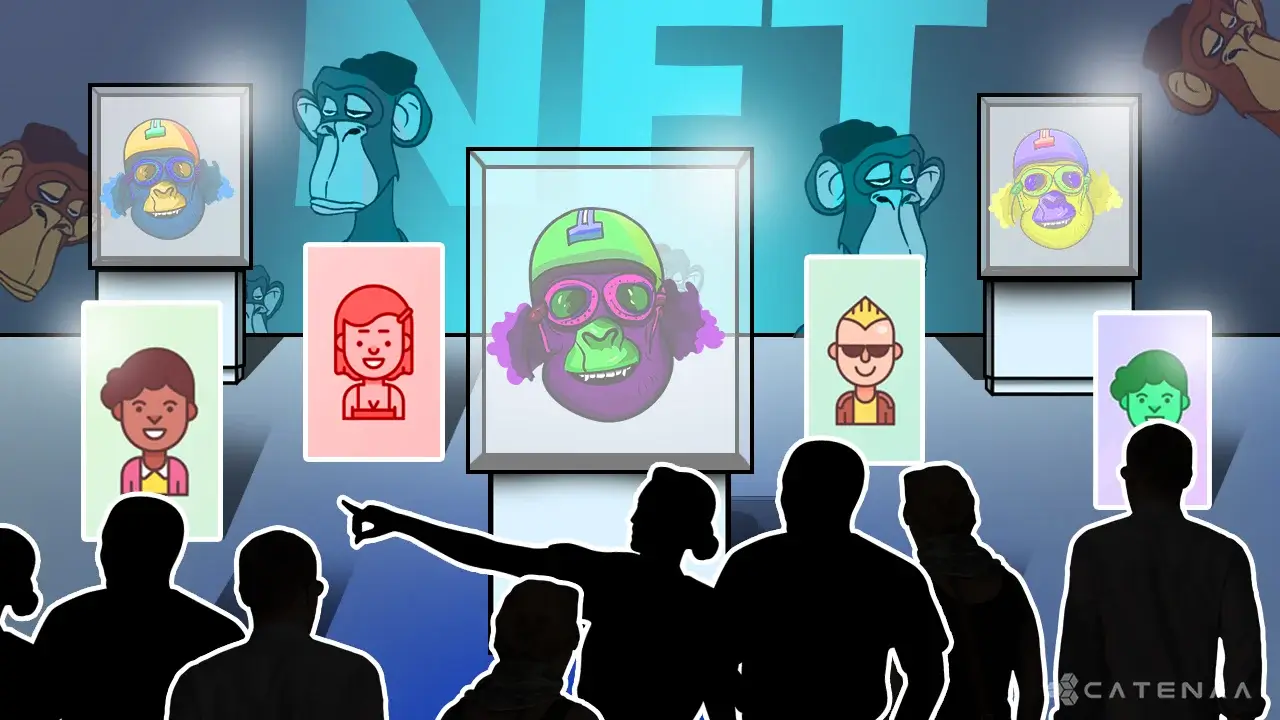NFT ticketing is transforming event ticketing by offering a safe, transparent, and efficient method of issuing and managing tickets. Because they are kept on a blockchain, Non-Fungible Tokens (NFTs) are much more difficult to fabricate or duplicate than traditional tickets. This reduces the danger of fraud and counterfeit tickets by allowing event organizers to ensure that only genuine tickets are utilized to access an event.
NFT ticketing also allows for greater customization and versatility in ticketing. Event organizers, for example, may offer NFTs for distinct event sections, such as VIP or general admission tickets. They can additionally provide information such as seat numbers or access to premium content. This can speed up the ticketing process and save time and money.
What is NFT ticketing?
NFTs are encrypted tokens representing distinct digital assets. They enable users to digitize digital or physical assets like art, souvenirs, or real estate. In addition, they serve as verifiable proof of legitimacy and ownership since they are kept on a blockchain network. Furthermore, an NFT can have only a single owner at any given moment and can not be changed or falsified.
NFT ticketing is true to what it sounds; NFT tickets are NFTs that reside on a blockchain and serve as access cards to any physical or digital event. So why is this different from digital tickets? The blockchain component distinguishes NFT tickets from their barcodes or QR code-based competitors.
NFT tickets benefit both issuers and recipients in a variety of ways. By using blockchain technology as a ledger, issuers may retain a more detailed record of attendance accounts while connecting with ticket buyers in a new and inventive way via NFTs. By compiling data linked with holders of specific NFT tickets, issuers may send out messages, arrange surprise giveaways, construct token-gated platforms and services, and much more.
Similarly, NFT ticket buyers receive more than just a ticket to an event: they also receive an immutable and frequently dynamic digital asset that gives them access to a performance or festival. In addition, these tickets also allow holders access to special events, such as fan groups comprised solely of NFT ticket holders.
How does NFT ticketing work?
When considering the internal workings of an NFT, event tickets come to mind. Physical tickets are often one-time-use pieces of paper only good for one event entrance or seat. Tickets are fungible in this sense. Tickets, like NFTs, are sold in a limited amount as live venues have limitations on seating.
The disadvantage of conventional ticketing is that tickets are distributed across several distribution channels with no oversight or supervision. For example, secondary ticket market resellers may raise prices, and ticket scalping traders can purchase most tickets online and resell them at a higher price. On the other hand, anyone can trace every transaction on a blockchain ledger using NFT tickets, making it simple for everyone to know where and when the ticket was purchased or sold – while event organizers have more control over prior and subsequent ticket sales.
Smart contracts, software that operates on the blockchain, and an NFT system for ticketing also help control resale value and costs. A smart contract comprises probabilistic software that performs specific actions when certain circumstances are met. For example, organizers can control how royalties are distributed on secondary sales of tickets by creating a rule that triggers a royalty payment every time the key has been sold to another individual.
NFT ticketing introduces an innovative approach to the creation and management of event tickets. The process typically involves several steps. Initially, an event organizer or ticketing agency leverages blockchain technology to generate a unique NFT ticket. This distinctive characteristic ensures that no other item of comparable value can be substituted for it. Subsequently, the public can obtain NFT tickets directly from the event organizer or through a web marketplace.
When a customer intends to attend an event, they are required to scan their ticket. The scanner utilizes blockchain technology to verify the authenticity of the ticket. Upon successful validation, the consumer is granted access. Sold NFT tickets can also be resold or traded on web exchanges, with their value fluctuating based on the demand for the event. Moreover, blockchain technology enables the tracking of a ticket’s origin and ownership, thereby enhancing security and deterring counterfeit or duplication attempts. The event organizer can also provide exclusive incentives and experiences to NFT ticket holders, such as VIP access or exclusive products. This enhances the whole event experience and adds a level of luxury that is impossible to accomplish with standard event tickets. 1
NFT tickets vs. traditional tickets
Traditional ticketing and NFT ticketing are two distinct techniques of controlling and selling tickets for events. An event organizer or ticketing supplier distributes digital or printed tickets in conventional ticketing. Tickets are offered in this scenario through licensed distributors, box offices, and ticketing sites. The ticket, once purchased, grants entrance to the event and is valid only once.
NFT tickets use blockchain technology to generate a one-of-a-kind, non-fungible token that reflects ownership of a single event experience. NFT tickets are primarily offered on digital platforms and can be resold for transfer or collected upon purchase. When NFT holders wish to attend an event, they must submit their tokens for verification utilizing blockchain technology.
We will evaluate the two techniques in terms of safety, tracking, fan involvement, and convenience of use, among other pertinent elements, in this section.
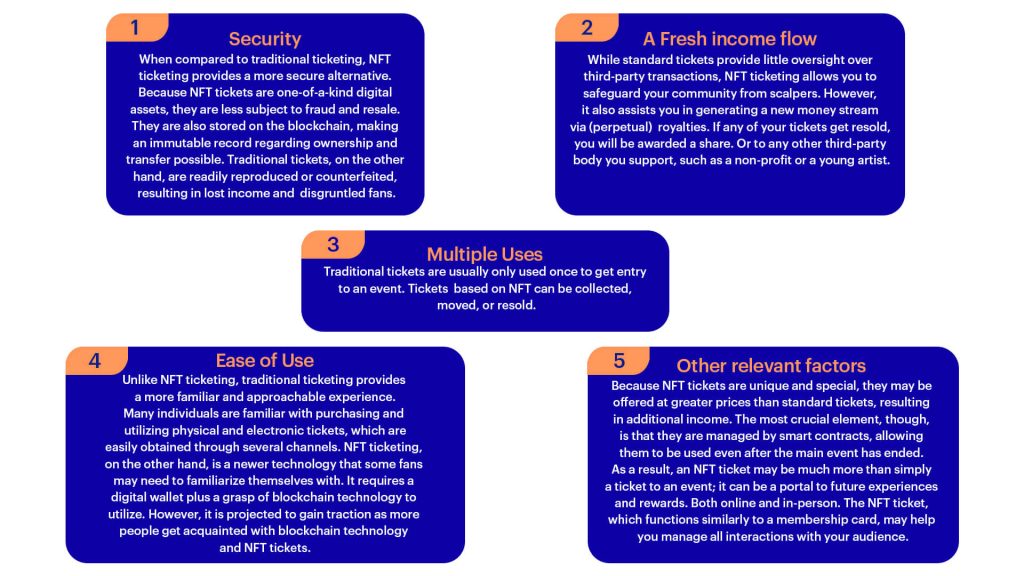
Traditional ticketing provides the advantages of familiarity and accessibility. NFT ticketing, on the other hand, provides a more secure, transparent, engaging, and responsible alternative for event tickets. We believe that as more people get acquainted with NFT ticketing, it will become the future of event tickets. 2
Cases and Success Stories
Numerous industries such as ticketing, are currently undergoing a major transformation due to the introduction of Non-Fungible Tokens (NFTs). NFT ticketing has drawn much interest since it can provide fans with distinctive and engaging experiences. Intriguing use cases & success stories show how NFT ticketing can revolutionize the ticketing environment and increase fan engagement.
- Concerts and Festivals
NFT ticketing has seen great success within the music industry by offering fans unique chances and digital artifacts. Famous musicians have used NFTs to offer exclusive concert tickets with notable extras. For instance, virtual concerts with A-list performers, where fans may buy NFT tickets to gain access to immersive live shows and virtual meet-and-greet encounters. These limited-edition NFTs are valuable digital collectibles for fans in addition to being tickets. - Sporting Events
Sporting events have adopted NFT ticketing to provide spectators with a memorable experience. Special edition NFT tickets that go beyond the scope of simple admission credentials have been made available for major events. These tickets frequently provide advantages such as VIP access, backstage privileges, or even the chance to interact with players. In addition, NFT ticketing enables sports fans to interact more deeply with the teams they love and their players, building a sense of enthusiasm and connection throughout the fan base. - Exclusive Meet & Greet opportunities
Fans may now take advantage of rare meet-and-greet chances with their favorite celebrities, musicians, and influencers, thanks to NFT tickets. Fans may arrange an in-person or online personal encounter with their heroes by purchasing an NFT ticket. These close interactions reinforce the tie between artists and their followers by fostering closer relationships between fans and their idols, resulting in priceless memories. - Virtual and Augmented Reality Experiences
Fans can have access to a variety of mixed-reality experiences thanks to NFT tickets. Fans may enjoy immersive digital settings, virtual concerts, or AR presentations by purchasing an NFT ticket. Fans may discover dynamic and captivating worlds from the comfort of their homes thanks to these experiences, which transcend opportunities by democratizing access to remarkable virtual experiences that exceed the limits of place.
NFT ticketing has great potential to revolutionize fan experiences across several sectors, as seen by its use cases and success stories. NFT tickets have given fans unmatched access, special benefits, and one-of-a-kind digital treasures to everything from music concerts and athletic events to art exhibitions and virtual reality experiences. We may anticipate more advancements and inventive uses of NFT tickets as their popularity increases, which will increase fan favor and change the way we interact with the activities we like.
In today’s era, an increasing number of individuals and companies have integrated NFT tickets into their workspaces, recognizing their immense value and potential. Let’s look at a few noteworthy examples:
- DC Comics, a division of WanerMedia, distributed comic book NFTs along with tickets for its DC FanDome event.
- Coinbase incorporated NFT goods into the Governors Ball Music Festival in New York, providing users with a free, one-of-a-kind NFT as well as admission to the VIP lounge.
- Coachella has its very own NFT marketplace, offering artwork, event photographs, and lifetime access ticket NFTs. 3
Pros & Cons
NFT ticketing presents a multitude of advantages when compared to conventional paper or digital ticketing methods. 4
These advantages include:
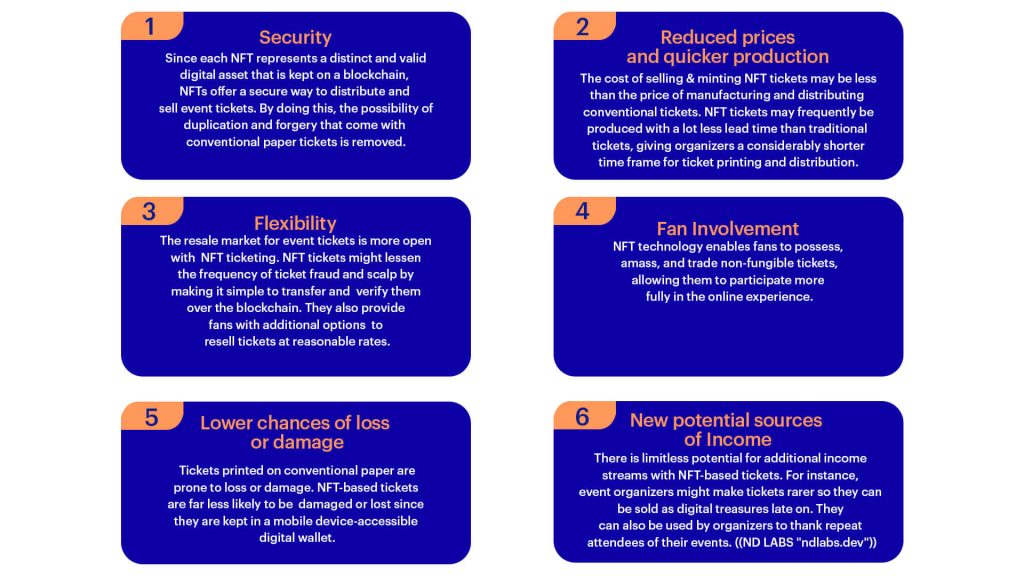
The use of NFT-based tickets does, however, come with significant concerns. Here is a short glance at them:
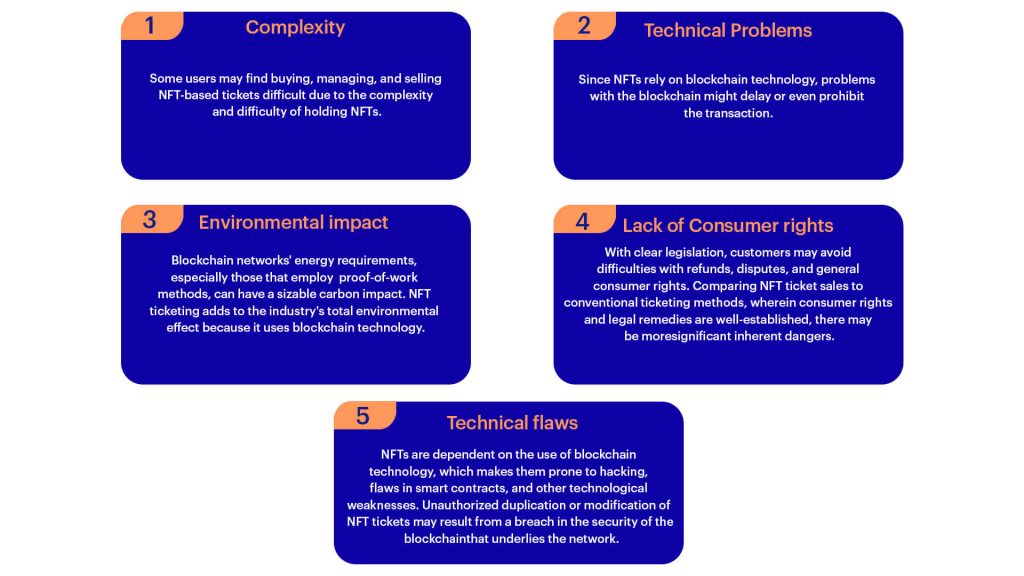
In order to promote trust, transparency, and consumer confidence, it is crucial for players in the NFT ticketing market to address these concerns through strong security measures, industry standards, and regulatory frameworks. 5
Future of NFT ticketing
As it combines the advantages of blockchain technology with the practicality and security of digital ticketing, NFT ticketing has a bright future. NFT ticketing has the potential to transform the ticketing sector with improved authentication, security, and scalability.
For ticket holders, the combination of augmented reality and virtual reality may produce immersive experiences, while flexible secondary markets and dynamic pricing mechanisms provide accessibility. NFT ticketing platforms are anticipated to connect with current ticketing ecosystems as they develop, create regulatory frameworks, and place a higher priority on environmental sustainability. NFT ticketing is used outside of entertainment and events in many other businesses. NFT ticketing is poised to revolutionize how tickets are purchased, sold, and experienced, empowering consumers via continual innovation and industry collaboration.
Which Ticketing is Right for You?
The type of tickets you use for your event ultimately depends on your needs. And what you want to accomplish. NFT ticketing is the way to go if you want better security, monitoring, and fan interaction. With NFTs, you have a more transparent and safe solution and can provide your audience with some truly awesome experiences.
On the other hand, traditional ticketing can be a better option for you if you only want to make it simple for your followers to purchase tickets and don’t necessarily require all the advantages described above. People are accustomed to it, and others may find traditional ticketing more convenient, particularly for smaller events.
Everything depends on your objectives and what you hope to accomplish with your event. Spend some time weighing the benefits and drawbacks of each approach. And you’ll discover the ideal ticketing strategy that works for your occasion and pleases your audience.
- Cointelegraph: cointelegraph.com[↩]
- Oveit: oveit.com[↩]
- Queueit: queue-it.com[↩]
- ND LABS: ndlabs.dev[↩]
- Enter.blog: www.enter.blog[↩]
